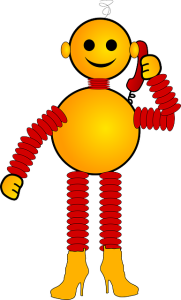PR Bots: Is AI After Our Jobs?
 By Cathy
By Cathy
 As we edge closer to a science fiction future of robots and artificial intelligence, the question on everyone’s lips has been: what will this mean for us mere mortals? Google’s developed AI recently beat the world champion at GO – a feat many thought would be far beyond the technology as it requires human instincts. Now, an AI bot has learned how to sounds and Tweet like Donald Trump: without accounting for taste, this does raise questions about the future of corporate communications and AIs role in the PR and marketing mix.
As we edge closer to a science fiction future of robots and artificial intelligence, the question on everyone’s lips has been: what will this mean for us mere mortals? Google’s developed AI recently beat the world champion at GO – a feat many thought would be far beyond the technology as it requires human instincts. Now, an AI bot has learned how to sounds and Tweet like Donald Trump: without accounting for taste, this does raise questions about the future of corporate communications and AIs role in the PR and marketing mix.
While much talk to date around AI has been focused on how it can take over low-skilled repetitive tasks, we can already see that these limitations are of human making – the technology is potentially capable of doing a lot more. While we may believe that humans have the instinct to do something bold and original which is what sets us apart from machines – but maybe this is socialised into us, and, therefore, learnable. If so, then even the creative industries that may have previously seen themselves as immune from the effects of AI could be in for some dramatic changes.
In many ways, the world of PR has been transformed by digitalisation, just like every other industry. In other ways, it is an industry built on relationships and trust, and an understanding of human reactions. Could a machine really deliver that subtle balance between being persuasive and incorporating a client message, alongside offering content that engages a wider audience? While many might scoff and say that creative writing and communications could never be a task for a robot, I’d temper your scorn. We can already see that robotics is being tested in journalism; in 2014 AP partnered with Automated Insights to begin automating quarterly earnings reports using their Wordsmith platform. Evidence suggests that most people can’t tell the difference between a human or AI article – if anything, the AI is not hampered by the curse of human error.
So perhaps the ‘people’ we PR’s will need to persuade and engage with will not be human at all? Instead of writing formulaic press release standardised template, we will just feed information into a machine to churn out the content. We may even see the robots making or taking calls for a sell in? Machine learning could allow the PR bots to understand the client message and hunt for features, analysing thousands of potential sources at once, automatically detecting when new requests, even searching through relevant content to provide a suggested response.
However, my human instinct says that there will always be a role for real people in the world of PR and journalism. Recent research has shown that in Western societies there is a preference for robots that look like robots, rather than realistic clones that could be mistaken for humans; we want to know if we are speaking to a human or a machine, we want to build relationships with humans, not machines. For now, anyway. As with any industry though, AI will find its place, but that doesn’t necessarily have to be feared; it is likely to free up PR professionals to focus on higher value activities. So I live in hope that this won’t be the end, just the beginning of a new era.